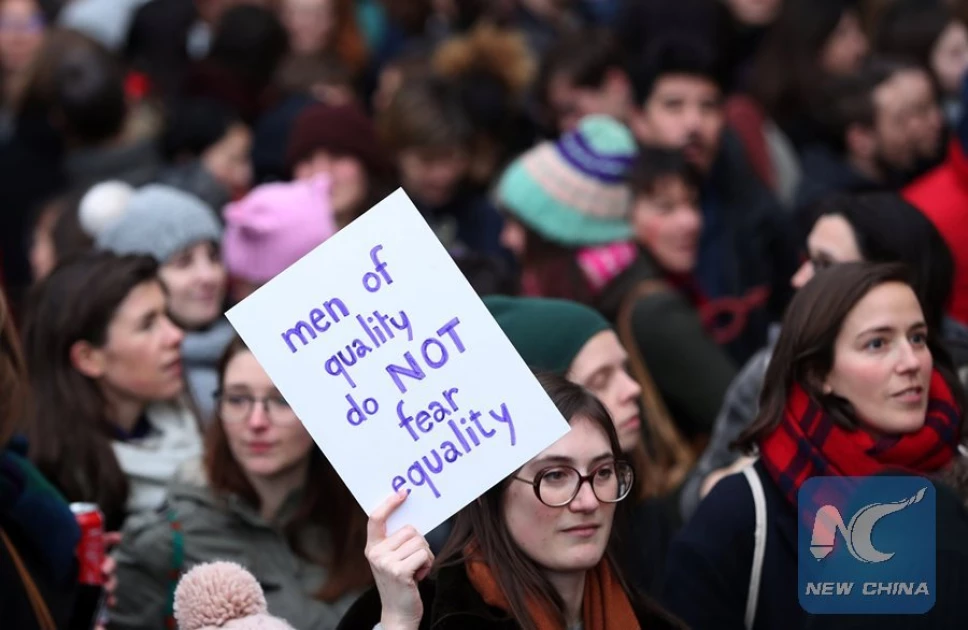OPINION: Track Gender Empowerment in Public Service Performance Contracts

People, mainly women, take part in a rally during the International Women's Day in central Brussels, Belgium, March 8, 2019. (REUTERS)

Audio By Vocalize
Two years ago, the Government of Kenya ceased tracking gender-equality efforts through performance contracts of Ministries, Departments and Agencies (MDAs).
That decision has slowed nearly two decades of steady progress in advancing women’s empowerment within the public sector. It’s time to reverse that decision.
Reinstating gender targets in performance contracts would reaffirm Kenya’s constitutional commitments, Vision 2030 goals, and obligations under the African Union’s Agenda 2063 and the Sustainable Development Goals
It would also strengthen evidence-based planning and budgeting and enhance Kenya’s standing in regional and global gender-equality rankings.
Performance contracting is a strategic approach reintroduced in 2003 to improve service delivery, align institutions with national goals, and ensure accountability to citizens.
Each MDA signs a legally binding contract committing to meet specific and measurable targets.
Senior officials, including Principal Secretaries, chief executives, and department heads, bear full responsibility for achieving agreed outcomes.
The government publishes an annual Public Service Performance Evaluation Report ranking MDAs based on their scores against targets.
Low performance ratings attract public scrutiny, administrative sanctions, and political pressure. Such consequences drive leaders to prioritise meeting their targets.
For many years, gender equality has been a core component of these contracts, with targets progressively refined to reflect evolving priorities and commitments.
Institutions submitted annual reports on gender work plans, budgets, policies, and staff numbers and positions by gender, reinforcing transparency.
This tool kept gender considerations at the centre of public service planning and budgeting.
To elevate the visibility of gender achievements and foster positive competition within the MDAs, the State Department for Gender and the National Gender and Equality Commission (NGEC) have consistently recognised top performers on gender empowerment during International Women’s Day celebrations.
In the 2023/24 performance contracting cycle, however, the government retired the gender indicator. Instead, institutions now send non-binding progress reports to the Gender Department and NGEC every two years.
This has sent the wrong signal that gender empowerment is no longer an essential objective in government. Without clear, enforceable targets, MDA leaders may give less attention to this vital issue.
Media reports suggest that the decision to drop the gender mainstreaming indicator was taken during a stakeholder forum of MDAs reviewing the performance contracting process.
The rationale was that the indicator had served its purpose and gender mainstreaming was now entrenched across institutions. However, this explanation doesn’t match the reality on the ground.
Evidence shows that maintaining gender targets matters. Practical Action, an international development organisation, with support from ENERGIA, reviewed gender mainstreaming in semi-autonomous agencies under the Ministry of Energy and Petroleum.
Its 2024 report found that gender targets in performance contracts were instrumental in driving the implementation of gender action plans, securing budgets, and elevating gender equality as a key institutional priority.
It noted that their removal risked draining momentum and undoing critical gains.
While Kenya has made notable progress in gender empowerment, women are still underrepresented in key metrics such as leadership, and many agencies still fall short of constitutional gender requirements. We cannot afford to slow the journey.
The country has robust laws and policies in place that support gender equality. For example, the Public Service Commission (Performance Management) Regulations provide a ready framework to integrate gender targets into institutional and employee appraisals.
What is needed now is political and administrative will to implement them.
Development partners, civil society, and the private sector can help by supporting advocacy, providing technical assistance, and sharing evidence of the benefits of measurable gender goals.
Coordinated and sustained action will keep gender equity at the heart of Kenya’s development agenda.
Senior government officials have publicly committed to revisiting the issue of gender in performance contracts. Action must follow words.
Doing so would be a clear and bold reaffirmation that Kenya values equality and results-driven governance.
Immaculate Wafula and Ally Jamah work with Practical Action, an international development organisation with programmes in Kenya and other countries in Africa, Asia and Latin America.
Email: Immaculate.Wafula@practicalaction.or.ke


Leave a Comment